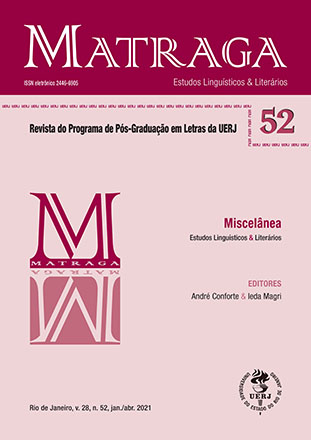Tabus linguísticos no léxico religioso: um estudo geolinguístico com base no Atlas Linguístico do Brasil
DOI:
https://doi.org/10.12957/matraga.2021.53251Palavras-chave:
Léxico. Tabus Linguísticos. Atlas Linguístico do Brasil.Resumo
O estudo busca descrever e analisar as denominações utilizadas pelos falantes das capitais do Brasil para nomear o item lexical “diabo”. Para isso, utilizaram-se inquéritos do Projeto Atlas Linguístico do Brasil (ALiB), realizados com 200 informantes, distribuídos equitativamente por ambos os sexos, em duas faixas etárias e dois níveis de escolaridade, selecionados de acordo com os critérios da Dialetologia Contemporânea. Pautando-se nos pressupostos teórico-metodológicos da Geolinguística Pluridimensional, analisou-se a primeira questão do Questionário Semântico-Lexical referente à área semântica da religião e das crenças, com o intuito de documentar a riqueza sinonímica para a variante “diabo”. Os dados foram coletados através da pergunta: “Deus está no céu e no inferno está ...?”. Foram registrados 506 dados lexicais, concretizados através de 39 variantes: anjo do mal, anjo mau, anticristo, besta, besta-fera, belzebu, bicho feio, bicho ruim, cão, capeta, capiroto, chifrudo, coisa, coisa ruim, cramulhano, criatura, cruz-credo, demo, demônio, desgraça, diabo, didi, encardido, enxofre, estrela vermelha, inimigo, lúcifer, maligno, mefítico, príncipe dos céus, rabudo, sapirico, satã, satangoso, satanás, sujo, tibinga, tinhoso, troço. A análise semântico-lexical revelou uma correspondência entre os recursos linguísticos substitutivos do referente diabo e os tabus linguísticos, registrados através de processos metafóricos, eufemísticos e disfemísticos.
Downloads
Downloads
Publicado
Como Citar
Edição
Seção
Licença
AUTORIZAÇÃO
A Matraga – Revista do Programa de Pós-Graduação em Letras da UERJ está autorizada a publicar o artigo ora submetido, caso seja aceito para publicação online. Fica atestado que a contribuição é original, que não está sendo submetida a outro editor para publicação, e que a presente declaração é a expressão da verdade.
Os trabalhos publicados no espaço virtual da Matraga – Revista do Programa de Pós-Graduação em Letras da UERJ serão automaticamente cedidos, ficando os seus direitos autorais reservados à Matraga. Sua reprodução, total ou parcial, é condicionada à citação dos autores e dos dados da publicação.

A Matraga utiliza uma Licença Creative Commons - Atribuição-NãoComercial 4.0 Internacional.





